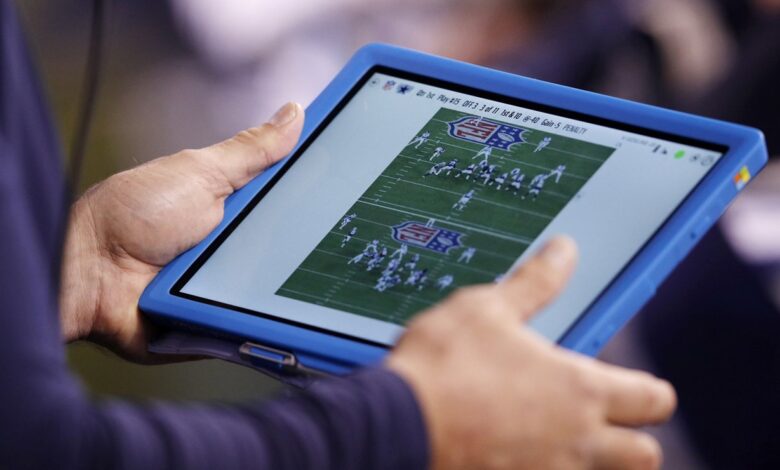Technology Innovations That Changed the NFL


The NFL has consistently utilised technological advancements to enhance gameplay, improve player safety, and deliver a superior fan experience. These innovations have had a profound impact, turning football into a highly data-driven and interactive sport. Across the broader sports landscape, technology changes in sports betting shows how technology redefines industries by combining accessibility, analytics, and user experience. The NFL’s approach to technology mirrors this trend, using modern tools to remain a leader in the world of sports.
Major Innovations That Shaped the NFL
Although there have been numerous changes, especially in technological aspect of the game, a few major ones are:
Helmet Safety Technology
Modern helmet designs have undergone a massive change, incorporating advanced impact sensors. These sensors measure the location and intensity of hits during play, providing real-time data that medical staff can use to identify possible concussions. Additionally, this data feeds into broader research, helping manufacturers improve helmet design for future seasons. The NFL’s commitment to reducing head injuries also reflects a growing awareness of player safety.
Instant Replay Systems
The introduction of instant replay has drastically improved officiating accuracy. With high definition video and multiple camera angles, referees are now able to review the close calls and overturn incorrect decisions. While critics will point to it for slowing the game down, it is important for fairness in the game, for instance when it’s the playoffs.
Data-Driven Strategies
Analytics have become a cornerstone of NFL team strategies. From scouting reports to in-game decisions, advanced data tools analyze everything from player tendencies to weather conditions. Coaches now rely on algorithms to determine whether to attempt a fourth-down conversion or stick with a safer play. This trend aligns with the increasing reliance on data across the sports industry, much like its role in sports betting.
Virtual Reality Training
Virtual reality (VR) has changed player training by offering a safe, immersive environment to simulate game scenarios. Quarterbacks can practice reading defenses without risking physical injury, while coaches use VR to develop tactical plans. This helps players refine skills and build confidence, contributing to overall team performance.
Enhanced Fan Interaction
For fans, the NFL has made the game experience more engaging through technology. Augmented reality apps bring highlights to life, while in-stadium features like 360-degree replays and interactive screens ensure fans never miss a moment. These tools make the NFL experience immersive, both at home and in the stands.
GPS and Wearable Tracking
Wearable devices equipped with GPS technology have transformed how teams monitor players. These tools measure performance metrics like speed, distance travelled, and fatigue to help coaches change training programs. Wearable tech helps protect the athlete from overexertion, preventing injury and keeping the athlete in peak condition all season long.
Smart Stadium Technology
NFL stadiums are equipped with smart features to improve the fan experience. From mobile ticketing to cashless payments, these advancements streamline logistics for attendees. Facial recognition systems also speed up entry, while interactive apps provide real-time updates on wait times and concession options. Smart stadiums ensure that fans enjoy convenience and entertainment in equal measure.
How Technology Impacts Player Performance?
Technology has made player performance optimization more precise than ever. Wearable devices track hydration, heart rate, and sleep patterns, providing coaches with actionable insights to refine training regimens. Players also benefit from custom recovery programs based on their biometric data, reducing downtime after injuries.
Film analysis tools powered by artificial intelligence allow athletes to evaluate their gameplay at a granular level. Quarterbacks, for instance, can study defensive patterns to anticipate plays, while linemen analyze footwork to gain an edge. These insights translate to sharper skills and better overall performance.
The Future of Tech in the NFL
The NFL’s tech trajectory suggests even more transformative changes ahead. AI powered predictive analytics can transform the way teams predict injuries, manage players, and plot out opponents. Soon, blockchain technology could impact the secure ticketing and authenticity of merchandise to make for a streamlined fan experience.
Virtual reality is also set to evolve, offering fans immersive experiences like attending games in virtual stadiums from their living rooms. As these advancements take hold, the NFL will continue to lead the charge in sports innovation, delivering value to players and fans alike.

NFL Draft Diamonds was created to assist the underdogs playing the sport. We call them diamonds in the rough. My name is Damond Talbot, I have worked extremely hard to help hundreds of small school players over the past several years, and will continue my mission. We have several contributors on this site, and if they contribute their name and contact will be in the piece above. You can email me at [email protected]


